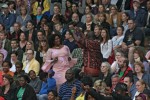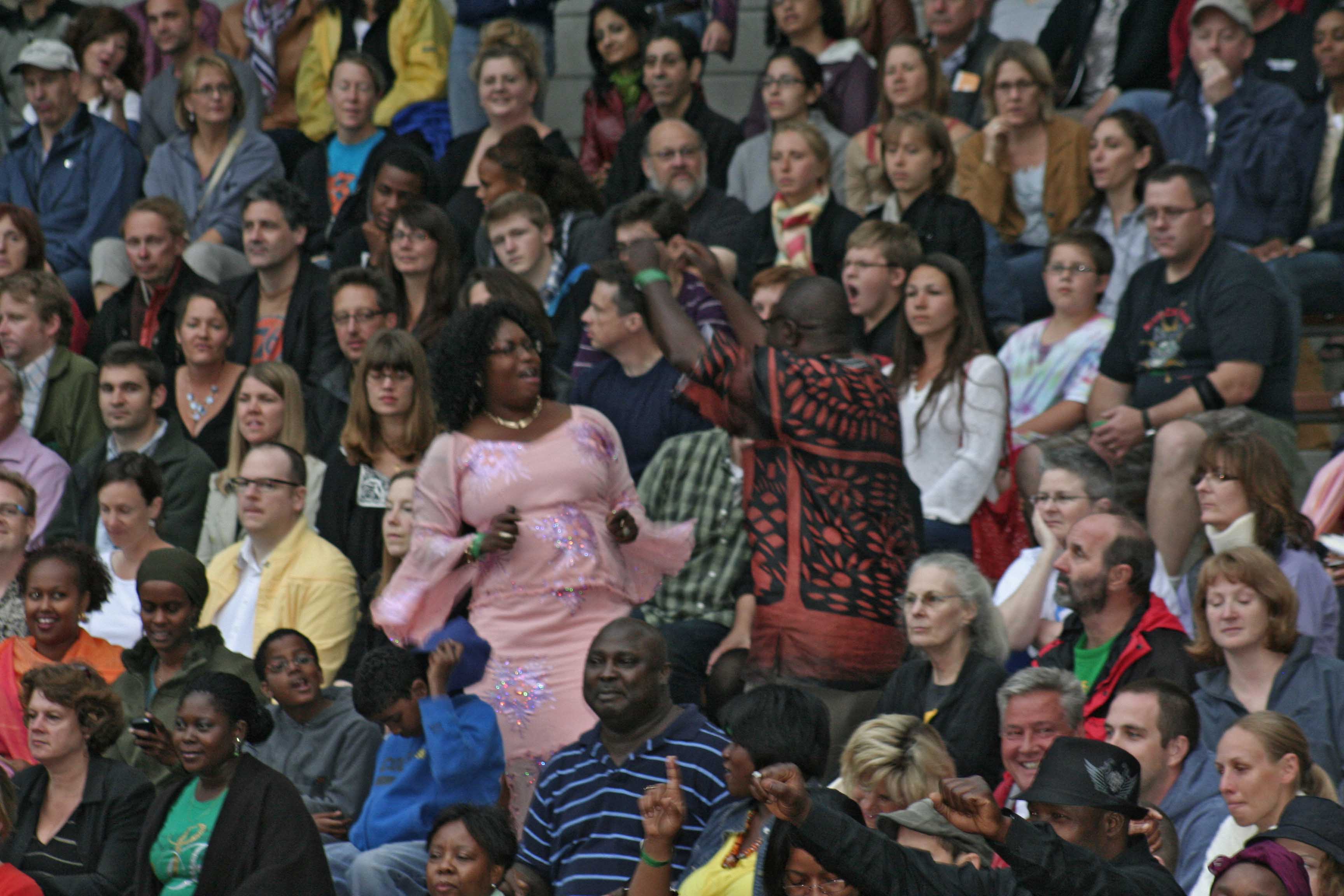
Wilson Coker left his Nigerian homeland 17 years ago. He now supervises a group home for Ramsey
County, Minnesota. Tuesday evening,
although still dressed in business attire, he moves his hips in true Nigerian
dance style. He might have lost a bit of
his accent, but he hasn’t lost the beat of traditional dance.
He came to the Minnesota Zoo on June 30th to hear
a favorite musician, King Sunny Adé who opened the evening of Nigerian music to
a near-capacity crowd of over 1300 people.
He stayed to experience superstar Femi Kuti close the house.
Under overcast skies, dark with foreboding rainclouds, Coker
finds himself pleasantly surprised with the music venue. “I expected something else, you know, at the
zoo, but this is great!” Coker said.
Adé has been entertaining audiences since the mid 60s. After forty years of performance, Adé has
perfected his signature juju music, a dance-inducing mingle of western pop and
traditional African, rooted in Nigerian guitar music.
His band of a dozen musicians warms up slowly on this chilly
evening with temperatures below 70 degrees.
They play with perfect synchronicity and South African sounding
harmonies. Adé may be the front man of
the band, but he doesn’t take the stage, rather blending in with the rest of
the band mates.
He does, however, elicit a strong, enthusiastic response
from those in the audience who speak his language. Adé calls out in Yoruba and the crowd
responds in kind with laughter and whistles.
The opening act lasts 75 minutes with a short intermission before Kuti
lands on stage. During this musical hiatus, Coker assures me that the dance
traditions of his homeland are indeed handed down through the musicianship of
people like Adé and through parties at home where, “we teach our children how
to move. We’re handing it down,” says Coker.
Johnny D, who hosts KFAI’s reggae-infused show on Friday
afternoons, fills in during the break between musicians as he pulls names from
a box and hands out prizes such as T-shirts and tickets to upcoming events. An emcee from the Zoo stalls for time telling
us that the entire stage is built and torn down each night. The stage sits only steps away from the
audience, giving customers a true chance at standing in very close proximity to
their desired stars.
In no time, Femi Kuti’s band, complete with trumpets,
trombone, saxophones and dancers wearing not much more than ropes of beads with
hot pants, climbs on stage. Adé had,
admittedly, pulled the crowd to our feet, but Kuti’s electrified music makes us
dance as if stepping on hot stones. In
his opening song Kuti calls out, “We all have to dance right down to the
ground,” before completing a dance move that has him touching the stage floor
with his hands.
Like his show last year, Kuti acts the chameleon, singing,
playing a triad of instruments, dancing, and directing with precision. With the cooler temps, his shirt stays on,
but his music sizzles in some places and mesmerizes in others.
His second number commands his listeners to Stop-stop-stop AIDS and Fight-fight-fight AIDS without any
details on how to follow his directive.
The volume increases to the point where I am blessing my earplugs,
begged off one of the security guards.
Wilson Coker looks as if he’s at least equally pleased with Kuti as he
was with Adé.
For me, there’s no comparison. Kuti eclipses the opening act. He engages the audience vocally as well as
physically—walking out to the lip of the stage and schmoozing with the dancers
among the concert goers. He maintains
tremendous eye contact with his band members, coaxing them on with his hands
and facial expressions.
Midway through his 75-minute show the band sings a song off
their latest album, which is reggae-sounding in spirit though not in tone. “Day by day by night by night we work and
pray for peace today…” Kuti calls out,
“Harmonies and melodies will bring peace!”
He then yells, “As far as I’m concerned, everything is politics.” He continues to pontificate until I am
tempted to raise my arms up as if in a revival tent meeting shouting Praise Be!.
In the final fifteen minutes, Kuti hands us a hot
potato. “Sex and music walk hand in
hand,” he says. “It is important for a
father to teach his son about sex and for a mother to teach her daughter,” he
says between intoning “Don’t come too fast.”
The double entendre is not lost on the wild and spirited audience. He then promises that those who learn the
intimacies of sex will some day, when they are sixty years old, start in with
romance at 9 or 10 o’clock in the evening and keep going until 4 in the
morning…”don’t come too fast…” The crowd
roars approval.
About Susan Budig
Susan is based in Minneapolis and reports on general assignments for Mshale with a focus on entertainment. In addition to reporting, she is also a writer, poet, teacher and coach.
- Web |
- More Posts(163)




